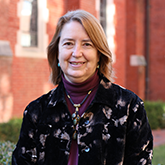
In Professor Sylvia Önder’s Disability & Culture Engelhard course, she aimed to restore the meaning of the word “care.” She expresses that the word has not only turned into a platitude, but that it has also been used to hide abuse as when the ideals of “health care” or “foster care” are dashed by harmful and discriminatory practices. Work needs to be done to redefine what care looks like in the classroom, particularly for those who identify as disabled, and Professor Önder commits herself to this task. She cites QTBIPOC author Leah Lakshmi Piepzna- Samarasinha, who identifies as a member of the disability community and defines care as "a place where disability justice and queer femme emotional labor intersect.”
It’s with this definition in mind, as well as the Jesuit motto, “cura personalis”, that students in her course are challenged with creating accessible living environments for members of “Care Houses.” Prof. Önder assigns each group of students to a virtual Care House, in which each group must explore their own needs as students and also consider the needs of ”virtual housemate” authors of the first-person disability narratives featured in the course readings. Her goal for such an assignment is to not only eliminate the deficit lens through which the disability community is often viewed, but to also break down the myth of independence and have students look inward to identify their own care needs. Prof. Önder deeply considered the instructional design of her Engelhard course, developing ways to lower stakes for assignments, encourage collaboration, and allow students to engage in activity-based learning. This pedagogical change, in tandem with the Engelhard module, had a profound impact on student learning outcomes and morale. Prof. Önder herself has been impacted by Engelhard in many ways, giving her the opportunity and permission to address student wellbeing. She’s a frequent participant in Engelhard events throughout the semester, including our Community of Practice Series and our Wellbeing Workshop Series. She says, “I really appreciate the Engelhard Project and I recommend it to other faculty.”
“The Engelhard Project's focus on student well-being has been essential in allowing me to break through my own fear of caring for student well-being, and to push toward a realization of the deep and always-in-process meaning of "cura personalis," the Jesuit motto of care for the whole person.”